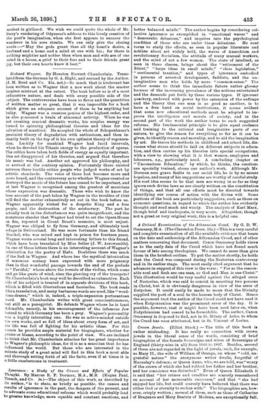Richard Wagner. By Houston Stewart Chamberlain. Trans- lated from the
German by G. A. Hight, and revised by the Author. (J. M. Dent and Co. 25s. net.)—So much that is irrelevant has been written as to Wagner that a new work about the master inspires mistrust at the outset. The book before us is of a most exhaustive nature, and deals with every possible side of the subject. The controversies have been so fierce and the quantities of written matter so great, that it was impossible for a book which gives an adequate account of them to be anything but bulky. Wagner was a creative genius of the highest order, and he also possessed a brain of abnormal activity. When he was not creating musical dramatic works, his surplus energy was turned to spinning philosophical theories and ideas for the salvation of mankind. He accepted the whole of Schopenhauer's pessimist theory of degradation with enthusiasm, and then in- stantly built on the top of it his own optimist theory of regenera- tion. Luckily for mankind Wagner had lucid intervals, when he devoted his Titanic energy to the production of operas. The critics have taken both fields of energy as equally important. One set disapproved of his theories, and argued that therefore his music was bad. Another set approved his philosophy, and so arrived at the contrary opinion. Fortunately there existed between these hostile critics people who judged works of art by artistic standards. The voice of these last becomes more and more heard, and the controversy as to whether Wagner created or destroyed the music of the future has ceased to be important, and at last Wagner is recognised among the greatest of musicians whose expression was dramatic. Those who wish to know the true account of the part taken by Wagner in the troubles of 1848 will find the matter exhaustively set out in the book before us. Wagner apparently wished for a despotic King and a free people, and the destruction of the aristocracy. The part he actually took in the disturbances was quite insignificant, and the monstrous slander that Wagner had tried to set the Opera House on fire, repeated in Count Beust's memoirs, is most unjust. Wagner was obliged to fly from Germany, and ultimately took refuge in Switzerland. He was more fortunate than his friend Roeckel, who was seized and kept in prison for fourteen years. Wagner wrote several long and interesting letters to this friend, which have been translated by Miss Seller (J. W. Arrowsmith). In one of these letters there is an interesting account of Wagner's admiration for the poetry of Ha6z. Doubtless there was much af the Sufi in Wagner. And where has the mystical intoxication of sensuous ecstasy been expressed with more poignancy than in that wonderful passage towards the end of the prelude to " Parsifal," where above the tremolo of the violins, which come and go like gusts of wind, rises the piercing cry of the trumpets? Mr. Chamberlain's book may well be described as exhaustive. Each side of his subject is treated of in separate divisions of this book, which is filled with illustrations and facsimiles. The book reads like a translation, and many barbarous words are used, like "word- tone-drama," which is, indeed, a triple-expansion portmanteau word. Mr. Chamberlain writes with great conscientiousness, but still as a panegyrist. He defends Wagner where he is least defensible, namely, in his encouragement of the infamous Jew hatred to which Germany has been a prey. Wagner's personality was a highly interesting one. He was so active-minded outside his own works, and so full of ideas about every form of art, and his life was full of fighting for his artistic ideas. For this reason he provides ample material for biographers, whether for praise or blame, according to the point of view. We are inclined to think that Mr. Chamberlain attaches far too great importance to Wagner's philosophic ideas, for it is as a musician that he has influenced the world. But those who are interested in the minute study of a great mind will find in this book a most able and thorough setting forth of all the facts, even if at times it is a little cumbersome in treatment.






































 Previous page
Previous page